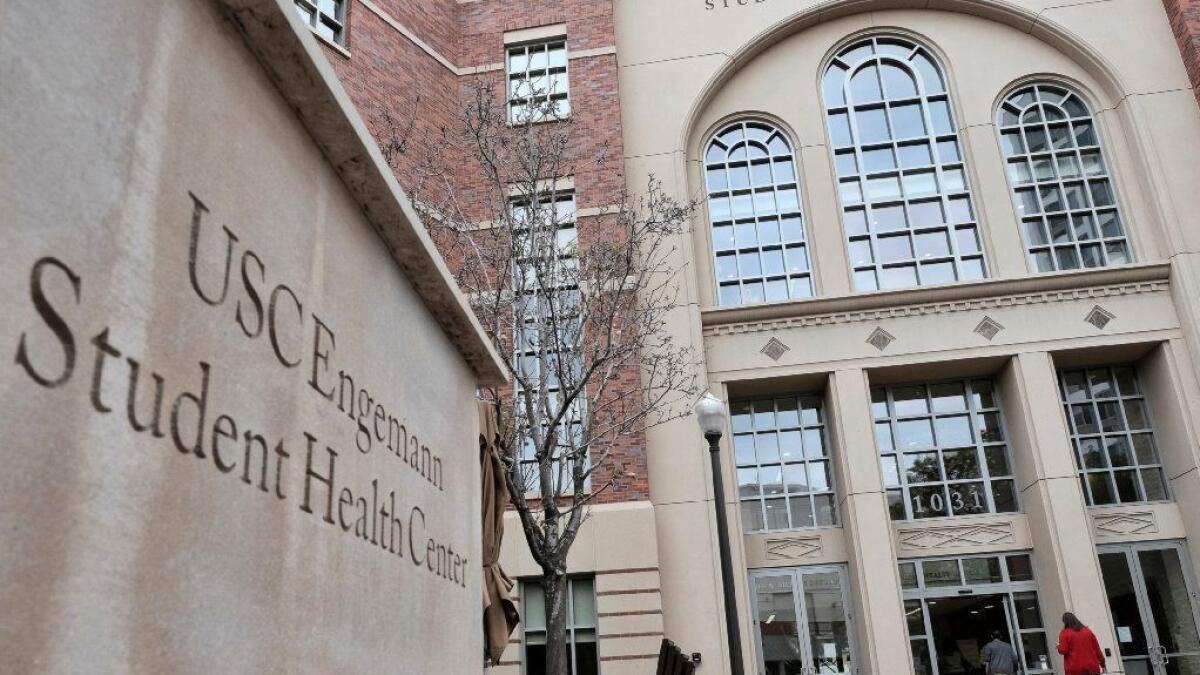LGBTQ alumni at USC allege men’s doctor sexually abused them

In another blow to USC’s student health clinic, six male graduates filed a lawsuit this week accusing a men’s health doctor of sexual battery and harassment during appointments.
The suit in Los Angeles Superior Court alleges that Dr. Dennis Kelly made demeaning remarks to defendants, all recent graduates who identify as gay or bisexual, about their sexual practices and performed unnecessary rectal exams designed to embarrass them or “to satisfy his own prurient sexual desires.”
Kelly, 72, retired last year after two decades at the campus clinic. He denied any inappropriate behavior toward patients and called allegations “terribly hurtful.”
“I can’t second-guess or question anything I’ve done,” Kelly said in a phone interview. “I know I did it all professionally and without any other motive.”
The men, who filed the suit anonymously, are seeking compensation from USC for negligent hiring and supervision, among other claims.
A university spokeswoman said USC was aware of the lawsuit and concerned by its allegations. “We’re working to understand the facts of this matter. We care deeply about our entire Trojan family, including our LGBTQ-plus community, and take this matter very seriously,” the spokeswoman, Brenda Maceo, said.
Attorneys representing the men said that revelations last year about another student health center physician, Dr. George Tyndall, prompted the litigation.
COMPLETE COVERAGE: Former USC gynecologist Dr. George Tyndall accused of inappropriate behavior »
Hundreds of female alumnae and students have accused Tyndall, the clinic’s longtime gynecologist, of sexual abuse, and the university agreed this fall to a $215-million settlement. Detectives have also presented 99 cases to the Los Angeles County district attorney’s office for potential charges against Tyndall, although prosecutors have not filed any criminal charges.
Kelly Van Aken, one of the attorneys representing Kelly’s former patients, said her firm was contacted by one of the plaintiffs, who in turn reached out to fellow alumni.
“They are all friends of friends who we spoke to. That’s how it all started,” Van Aken said.
The plaintiffs did not formally report Kelly’s alleged behavior to USC, nor did they contact police. One plaintiff said in court papers that he complained about Kelly to another doctor at the clinic, who responded that the rectal exam “shouldn’t have happened.”
Before filing the suit, the lawyers reviewed the plaintiffs’ medical records and contacted experts in men’s health. The experts opined “that the totality of the circumstances in the examination room was not within the standard of care,” said Mikayla Kellogg, another attorney representing Kelly’s former patients.
The suit describes a pattern of conduct by Kelly during appointments. After learning the patients had sex with other men, the suit charges, Kelly asked a series of intrusive questions, such as how much pornography they consumed and whether they “hooked up” with sexual partners online.
The suit alleges that Kelly demanded they disrobe in front of him and ordered them to get on their hands and knees while he performed rectal exams.
In the phone interview, Kelly said that when patients undressed, he either turned away or left the room. The doctor said the standard of practice was for a clinician to perform a rectal swab while also inspecting for anal warts.
One plaintiff, a 26-year-old man, said in an interview that he felt Kelly’s graphic questions were “judgmental” and that he was unnerved having to undress while the physician “just sat there staring.”
He said the doctor told him to get on the exam table, on hands and knees, without explaining why.
“All of a sudden I felt him insert something for about 30 seconds,” recalled the patient, who said he suspects Kelly was swabbing him for a sexually transmitted disease, but he is unsure. “There was no warning that anything was going to happen.”
The plaintiff said that he stopped seeing Kelly and began using an LGBTQ resource center in Hollywood for his sexual health appointments.
In an interview, Kelly said he was an openly gay physician and that he had devoted much of his career to counseling LGBTQ patients about ways to reduce the risks of their sexual behavior.
He said he never used the graphic terms described in the lawsuit or performed unnecessary genital exams. He said he suspected his stern warnings about behavior that put patients at risk for sexually transmitted diseases were misinterpreted as condemnation or deviance.
“It was something I was aware of as likely to happen, so I tried to take extra precautions that I didn’t come across as judgmental or shaming,” Kelly said.
More to Read
Sign up for Essential California
The most important California stories and recommendations in your inbox every morning.
You may occasionally receive promotional content from the Los Angeles Times.












